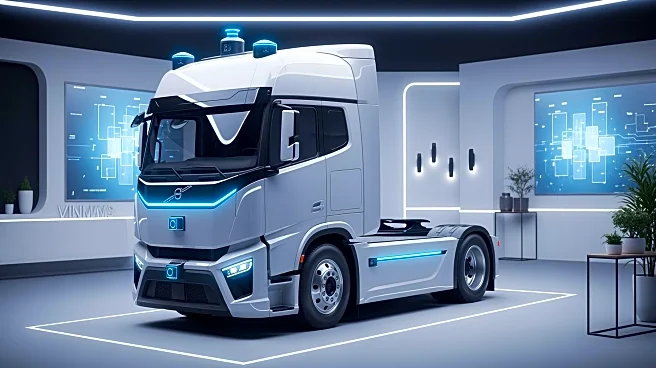What's Happening?
Waabi, a leader in physical artificial intelligence, has partnered with Volvo to unveil a next-generation self-driving truck, the Volvo VNL Autonomous. This collaboration marks a significant milestone in autonomous trucking, integrating Waabi's AI-driven
Waabi Driver with Volvo's advanced vehicle systems. The truck features NVIDIA's DRIVE AGX Thor and Hyperion 10 architecture, enhancing its capabilities for safe and scalable Level 4 autonomous operations. The partnership aims to address the growing demand in the U.S. freight market, which faces a shortage of qualified drivers. The Volvo VNL Autonomous is produced at Volvo's New River Valley plant in Virginia, equipped with six redundant systems to ensure safe driverless operations.
Why It's Important?
The introduction of autonomous trucks like the Volvo VNL Autonomous could significantly impact the U.S. freight industry by addressing driver shortages and increasing efficiency. AI-powered trucks can operate longer hours than human drivers, potentially reducing shipping delays and lowering transportation costs. This technological advancement also promises to enhance road safety by minimizing fatigue-related crashes. However, the shift towards automation raises concerns about employment, as millions of truck drivers may need to transition to new roles. Additionally, data privacy and cybersecurity are critical considerations, given the constant cloud connectivity required for these vehicles.
What's Next?
As Waabi and Volvo continue to develop their autonomous trucking solution, the focus will be on achieving broad commercial deployment. This involves overcoming regulatory challenges and building public trust in driverless technology. Labor groups and state officials may advocate for retraining programs to support workers affected by automation. The collaboration also highlights the need for transparency and rigorous safety trials to ensure public confidence in sharing roads with autonomous vehicles. The success of this initiative could pave the way for further advancements in AI-driven transportation solutions.
Beyond the Headlines
The integration of AI in trucking not only addresses immediate logistical challenges but also represents a broader shift towards automation in various industries. This development could lead to long-term changes in employment patterns, requiring new skill sets and job roles. Ethical considerations around data privacy and cybersecurity will become increasingly important as autonomous systems become more prevalent. The cultural acceptance of sharing roads with driverless vehicles will depend on consistent safety records and effective communication about the benefits and risks of such technology.
















